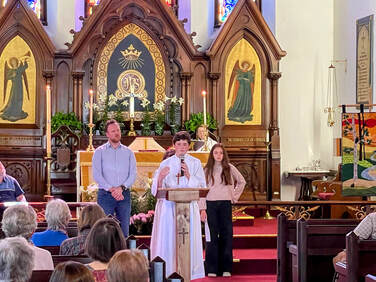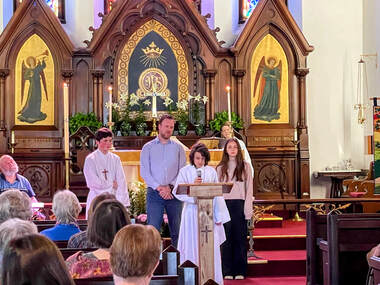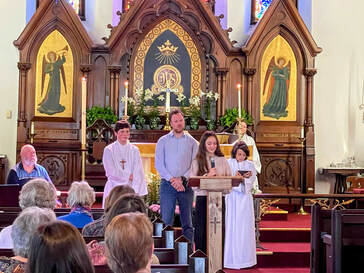 Today's sermon was offered by three SsJA Youth: From Logan Blais: Intro: When people think of climate change, they generally think of cars, and driving less. But emissions from transportation, like buses, cars, planes, ATVs, golf cars, etc, only add up to only 14% of all of what is being made. Part 1: In 2014, studies showed that the US is in second place, with a whole 15% of the world’s emissions, only following China with 30%. Americans are known to live a more consumer like lifestyle than our European neighbors. This EU has a total production of 9%. Big businesses, like Amazon and Car manufacturers, are creating a whole 24%, and this number only includes the gasses produced in the process of making these products. Nothing about transporting the parts, or delivery. Producing electricity and heat, something that is needed more and more these days, is responsible for 25%, or a fourth of all of these gasses. Part 2: The first thing that we think to do to help is to drive less, start biking, or walking more. But this is really hard, because our world is based on driving from place to place. This means that shopping locally is much better for the environment than ordering something on Amazon. Something that will also help a lot is trying to use less electricity. If this is by using a dryer less, or by not having all the lights on, this can both save you money, and help our world. Conclusion:While this may seem like old news, use reusable bags, be careful how much energy you use, and walk more. They help cut the amount of plastic and paper being made, witch in term, helps the world. Scores: https://www.epa.gov/ghgemissions/sources-greenhouse-gas-emissions#:~:text=Industry%20(24%25%20of%202020%20greenhouse,produce%20goods%20from%20raw%20materials.  From Hendrick Carew: Compost: Environmental: It reduces methane emissions, a potent greenhouse gas Methane is also a powerful greenhouse gas. Over a 20-year period, it is 80 times more potent at warming than carbon dioxide. It prevents compostable waste from ending up in landfills, which replace natural habitats and leak into surrounding areas. Economical: Diverting compost away from garbage reduces your trash bill and produces a valuable resource. Only 4.1% of all food waste is composted! Plants & Garden: Compost contains essential nutrients for healthy plant growth. You won’t need chemical fertilizers, herbicides, or chemical pesticides. Community: Creating a closed loop by composting organic waste creates a stronger, more resilient food system. How to compost at home
 From Keeley Coorigan:
|
We are blessed to have a diversity of preaching voices in our parish. Our guild of preachers is a mixture of lay and clergy. We hope you enjoy the varied voices. Meet our Preachers
All
Archives
July 2024
|